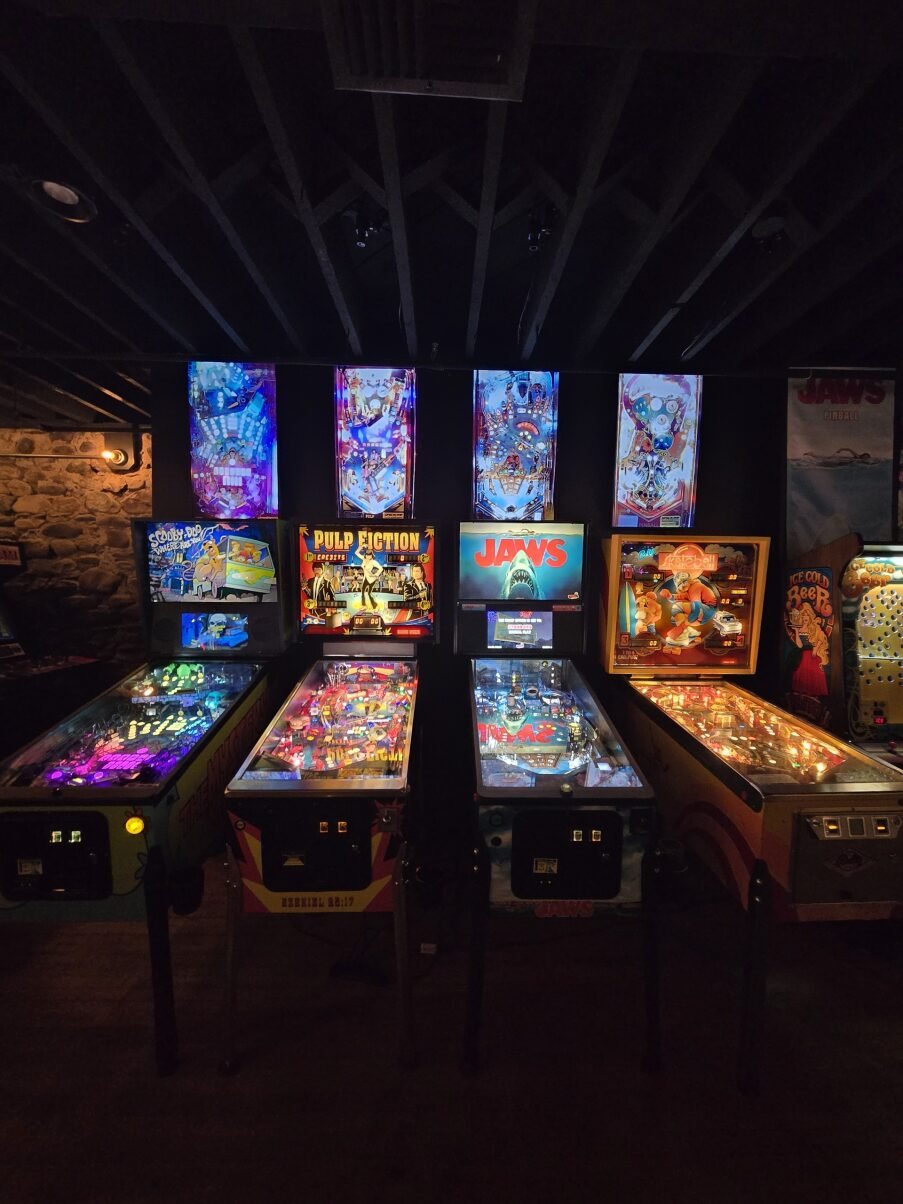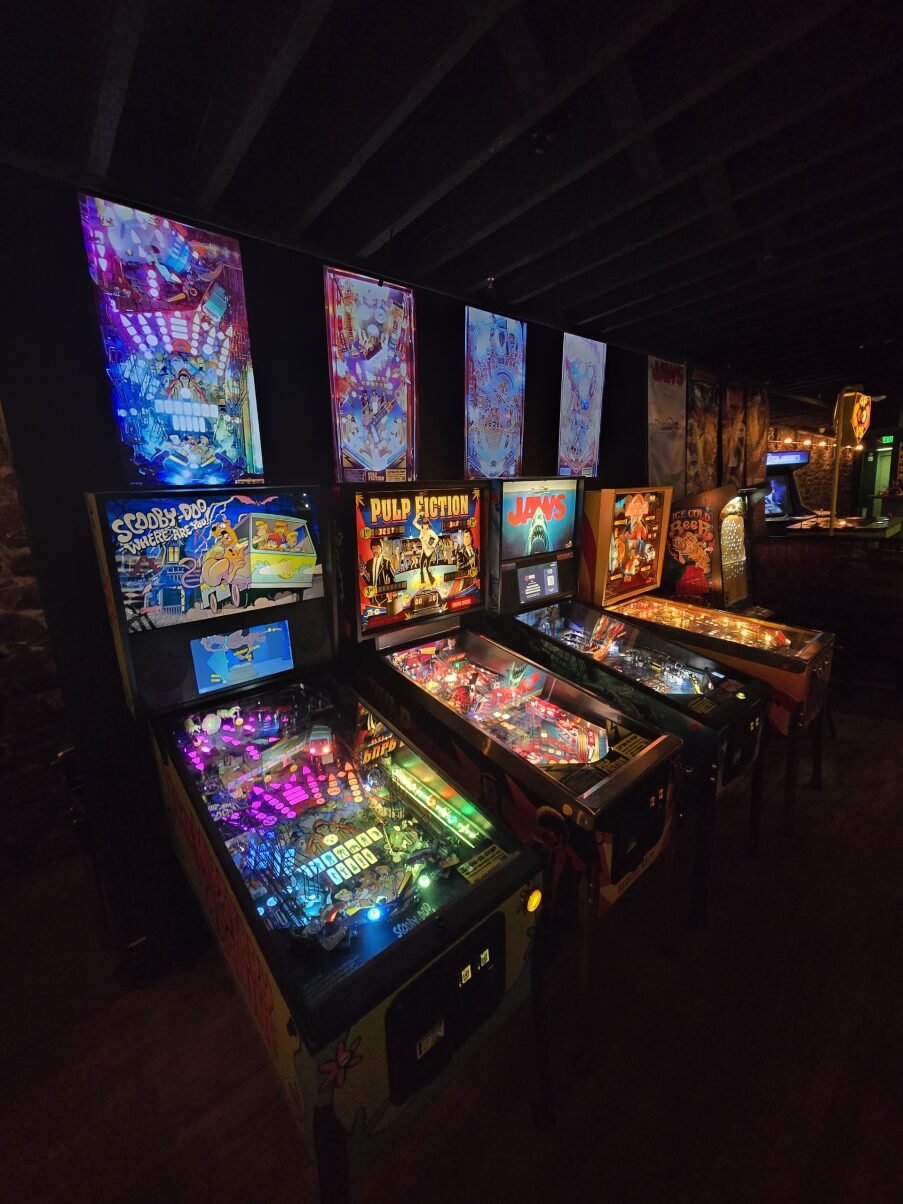
Flippers, Friends, and Silver Balls
The Growth of Missoula’s Pinball Culture
Written by: Noah Gardner
I’m shoulder to shoulder with people of all ages, glued to the lights and paddles of the machines. A cacophony of music, laughter, and electronic noise fills the dim basement of GILD Brewing in Missoula, Montana. Pinball machines from each decade line every wall and corner, their lit-up screens glow in the golden fluorescent light and posters by the bar advertise prizes for pinball tournaments in the upcoming weeks. A few days prior, on a pinball forum, I discovered that GILD had one of the only public “Funhouse” pinball machines in Montana. In the pinball community, “Funhouse” is regarded as one of the all-time greats. So, I set off for GILD with pockets jingling full of quarters. That evening, my pockets now empty, I found that I had discovered more than just a fun place to play pinball. Instead, I found an entire community of dedicated pinball players and fans. I was hooked on Missoula’s pinball scene. Why isn’t pinball bigger in Montana, I asked myself, and why does the culture seem to thrive in Missoula?
On the right-hand side of GILD’s Iron Maiden pinball machine, I noticed a small notecard advertising a pinball business called Spin-A-Rip, a pinball rental company located in Missoula. During an interview, the owner, Seff Propios, shared how he was inspired during the pandemic when most arcades began to close and rent out their machines. “Out of desperation, these remaining arcades were starting to rent their games out just to create some kind of revenue stream,” Said Propios, continuing, “and I read that, and I thought, wow, renting games out actually would work in a town like Missoula.” Before opening his business, Propios had been a part of the pinball community in its infancy around 2018. However, with the opening of GILD and OddPitch, a Missoula brewery that also caters to pinball players, the scene began to change. Propios recounted, “Once GILD came around and then OddPitch, between both locations I want to say we have 30 games, and then there’s a dozen more scattered throughout town. But both spots started to have tournaments and started to gain more and more momentum.” Today, he maintains, repairs, and houses some of the machines at GILD and has seen how the pinball crowd has evolved in Missoula.
If you look at recurring themes in pinball machines, retro rock bands such Rush, Led Zeppelin, and Kiss or retro blockbuster films like Star Wars, Jaws, and James Bond, you might be inclined to think that pinball culture was mainly kept by a specific demographic of players: male, competitive, middle-age. However, as Propios pointed out, that wasn’t the case. “It’s a pretty diverse crowd, men, women, LGBTQ members. You have ultra right-wing guys, super competitive people, and people who couldn’t care less but just have fun playing pinball.” In this regard, GILD provides a space where individuals of all backgrounds, views, and beliefs can come together over a game that transcends demographics. On the competitive side, Missoula caters to both the casual and competitive pinball scene. OddPitch’s tournaments are certified by the International Flippers Pinball Association (IFPA), an association for internationally sanctioned pinball tournaments while GILD tournaments are catered more to the casual player. Together, both businesses cater to specific sectors of the pinball crowd.
With the demographic in mind, I still needed to know what factors were keeping pinball culture from spreading to the rest of Montana. My first guess was the price. The lowest price for the average machine from Stern, a popular brand of pinball machine, starts at $7,000. This is a steep investment for anyone looking to house a machine, and according to Propios, this isn’t the only hurdle. Pinball machines are quite large. If a business doesn’t have adequate space, they are sacrificing room for a machine. “It’s kinda tough to crack a spot that doesn’t already have an existing game setup,” said Propios, “because, especially from a restaurant’s point of view, that’s potential table space that I’m giving up to put a game in”.
Space and price aren’t the only issues for pinball machines; with the physical nature of pinball, repairs are inevitable. Unlike most modern arcade games, pinball machines are a joint venture between physical mechanisms and computer technology. Depending on the machine, there can be thousands of individual moving parts and mechanisms, especially compared to a classic arcade cabinet like a Pacman or Donkey Kong machine. Those machines have only a few moving parts such as buttons and joysticks. “It’s a physical medium.” Propios explained, “You have a steel ball bashing into plastics, metal, and wood. So, that causes a lot of wear and tear. Obviously, arcade games you do have to fix things occasionally, but not on the level or frequency as you would for pinball.” This maintenance requires business owners to learn how to fix the machines themselves or have a dedicated staff or service on call. This level of needed attention can dissuade businesses from buying machines in the first 58 Photograph by Noah Gardner place. “The ultimate goal for these pinball manufacturers is to get into a location like Dave & Buster’s or Arcade1Up you know, whatever those chains are.” Propios explained. “But the problem you run into is these national chains, they don’t wanna deal with having a maintenance guy specifically for the pinball machines because a lot of them know how much work they take.” Having a dedicated business that rents and maintains machines gives Missoula a leg up over Montana cities that don’t.
“Business like GILD give their players a consistent playing experience where machines can be fixed quickly and consistently.”
Compare this to locations where a machine can go unrepaired for days or even months, and the thought of a community growing in Missoula doesn’t seem as far-fetched. Despite these setbacks, Missoula’s pinball culture continues to grow and thrive. Propios continues to rent machines across Missoula and the Bitterroot Valley as well as maintain the existing machines in GILD. As for the future of pinball, Propios is optimistic. “Now we’re in what they consider the third renaissance. I think this third renaissance started because, by and large, everything has been reduced to looking and interacting with the screen. I think pinball’s allure or attraction, by and large, is you’re dealing with a physical medium.” Explained Propios “And I think there’s a real attraction to that because everyone’s plugged into a screen. So, pinball is a good way to unplug and get reconnected with the physical world in a sense. I think that has drawn a lot of people back.”
What started with a trip to Missoula became a lingering investigation of how pinball culture began to thrive there. When I descended the stairs to GILD’s basement arcade, I saw how passionate players were about their game and their community, but behind the scenes, individuals like Propios dedicate their time and business to making sure the machines run smoothly.
Without their passion, Missoula’s pinball culture may not have been able to grow into what it is now. Today, pinball stands out amongst most screen-based entertainment. It reminds us to connect with the physicality of our world in an era dominated with screens. So, the next time you’re in Missoula, take the trek to GILD or OddPitch, dump a few coins into whatever machine calls to you, and let the lights and sounds whisk you away. Don’t fear if you’re not good your first time around, the community will treat you right.

